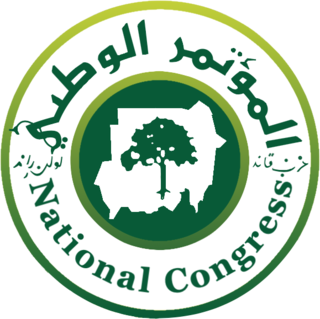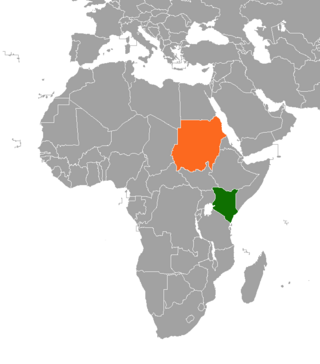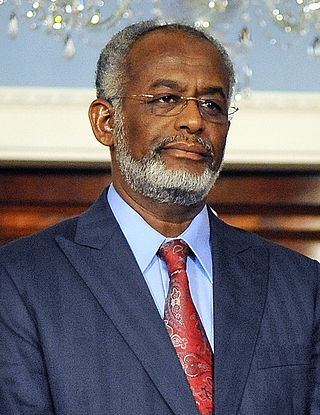This article needs additional citations for verification .(March 2024) |
Aldo Deng is a former Sudanese politician and father of several professional basketball players.
This article needs additional citations for verification .(March 2024) |
Aldo Deng is a former Sudanese politician and father of several professional basketball players.
In 1988, Deng sent his wife and children to Alexandria to avoid the escalating Second Sudanese Civil War. The next year, Omar al-Bashir led a military coup that took control of the government, and Deng was arrested at gunpoint, spending three months in prison. Omar al-Bashir released Deng so that Deng could negotiate with the Sudan People's Liberation Army of southern Sudan, but in 1993, Deng fled to the United Kingdom and claimed political asylum. Shortly afterwards, he travelled to Egypt to collect his family, and they settled in South Norwood, London. [1] He has since organized several charities to support women, children, and schools in Sudan. [2] After the end of the civil war in 2005 and the independence of South Sudan in 2011, he returned to serve on the committee that wrote the new country's constitution. [3]
Deng is the father of 16 children, several of whom have become notable for their basketball prowess. Son Luol Deng attended Duke University and has played for the Minnesota Timberwolves and the Chicago Bulls of the National Basketball Association; sons Ajou Deng and Deng Deng have played in the British Basketball League; and daughter Arek Deng played for the University of Delaware. [2]

Sudan, officially the Republic of the Sudan, is a country in Northeast Africa. It borders the Central African Republic to the southwest, Chad to the west, Egypt to the north, Eritrea to the northeast, Ethiopia to the southeast, Libya to the northwest, South Sudan to the south, and the Red Sea to the east. It has a population of nearly 50 million people as of 2024 and occupies 1,886,068 square kilometres, making it Africa's third-largest country by area and the third-largest by area in the Arab League. It was the largest country by area in Africa and the Arab League until the secession of South Sudan in 2011; since then both titles have been held by Algeria. Its capital and most populous city is Khartoum.

Currently, the politics of Sudan takes place in the framework of a federal provisional government. Previously, a president was head of state, head of government, and commander-in-chief of the Sudanese Armed Forces in a de jure multi-party system. Legislative power was officially vested in both the government and in the two chambers, the National Assembly (lower) and the Council of States (higher), of the bicameral National Legislature. The judiciary is independent and obtained by the Constitutional Court. However, following a deadly civil war and the still ongoing genocide in Darfur, Sudan was widely recognized as a totalitarian state where all effective political power was held by President Omar al-Bashir and his National Congress Party (NCP). However, al-Bashir and the NCP were ousted in a military coup which occurred on April 11, 2019. The government of Sudan was then led by the Transitional Military Council or TMC. On 20 August 2019, the TMC dissolved giving its authority over to the Sovereignty Council of Sudan, who were planned to govern for 39 months until 2022, in the process of transitioning to democracy. However, the Sovereignty Council and the Sudanese government were dissolved in October 2021.

Omar Hassan Ahmad al-Bashir is a Sudanese former military officer and politician who served as Sudan's head of state under various titles from 1989 until 2019, when he was deposed in a coup d'état. He was subsequently incarcerated, tried and convicted on multiple corruption charges. He came to power in 1989 when, as a brigadier general in the Sudanese Army, he led a group of officers in a military coup that ousted the democratically elected government of prime minister Sadiq al-Mahdi after it began negotiations with rebels in the south; he subsequently replaced President Ahmed al-Mirghani as head of state. He was elected three times as president in elections that have been under scrutiny for electoral fraud. In 1992, al-Bashir founded the National Congress Party, which remained the dominant political party in the country until 2019. In March 2009, al-Bashir became the first sitting head of state to be indicted by the International Criminal Court (ICC), for allegedly directing a campaign of mass killing, rape, and pillage against civilians in Darfur. On 11 February 2020, the Government of Sudan announced that it had agreed to hand over al-Bashir to the ICC for trial.

Dr. John Garang De Mabior was a Sudanese politician and revolutionary leader. From 1983 to 2005, he led the Sudan People's Liberation Army/Movement as a commander in chief during the Second Sudanese Civil War. He briefly served as First Vice President of Sudan for three weeks, from the comprehensive peace agreement of 2005 until his death in a helicopter crash on July 30, 2005. A developmental economist by profession, Garang was one of the major influence on the movement that led to the foundation of South Sudan independence from the rule of the government of Omar Bashir the former president of Sudan (Khartoum).

Ali Osman Mohammed Taha is a Sudanese politician who was First Vice President of Sudan from July 2011 to December 2013. Previously he was Minister of Foreign Affairs from 1993 to 1995, First Vice President from 1995 to January 2005, and Second Vice President from August 2005 to July 2011. He is a member of the National Congress Party.

Sadiq al-Mahdi, also known as Sadiq as-Siddiq, was a Sudanese political and religious figure who was Prime Minister of Sudan from 1966 to 1967 and again from 1986 to 1989. He was head of the National Umma Party and Imam of the Ansar, a Sufi order that pledges allegiance to Muhammad Ahmad (1844–1885), who claimed to be the Mahdi, the messianic saviour of Islam.

Luol Ajou Deng is a South Sudanese-British former professional basketball player. He was a two-time NBA All-Star and was named to the NBA All-Defensive Second Team in 2012. Born in what is now South Sudan, Deng fled the country with his family as a child, eventually settling in the United Kingdom. He became a British citizen in 2006, and has played for the Great Britain national team.

The National Congress Party was a major political party that dominated domestic politics in Sudan from its foundation until the Sudanese Revolution.

Salva Kiir Mayardit, also known as Salva Kiir, is a South Sudanese politician who has been the President of South Sudan since its independence on 9 July 2011. Prior to independence, he was the President of the Government of Southern Sudan, as well as First Vice President of Sudan, from 2005 to 2011. He was named Commander-in-Chief of the Sudan People's Liberation Army (SPLA) in 2005, following the death of John Garang.
Deng Gai is a South Sudanese former professional basketball player. A power forward, he briefly played in the National Basketball Association (NBA) and in several other leagues. Gai was the 2005 NCAA Division I men's basketball season blocks leader.

Abdel Rahim Mohammed Hussein is a Sudanese politician and the former Governor of Khartoum State. Hussein served as the longstanding Minister of National Defense of The Republic of Sudan. Hussein also served for a period as the Minister of Interior Affairs. During his term as Minister of Interior Affairs, he opened the Rabat University. Hussein was arrested in early April 2019 following a coup on 11 April which overthrew al-Bashir.

This article covers the period of the history of Sudan between 1985 and 2019 when the Sudanese Defense Minister Abdel Rahman Swar al-Dahab seized power from Sudanese President Gaafar Nimeiry in the 1985 Sudanese coup d'état. Not long after, Lieutenant General Omar al-Bashir, backed by an Islamist political party, the National Islamic Front, overthrew the short lived government in a coup in 1989 where he ruled as President until his fall in April 2019. During Bashir's rule, also referred to as Bashirist Sudan, or as they called themselves the al-Ingaz regime, he was re-elected three times while overseeing the independence of South Sudan in 2011. His regime was criticized for human rights abuses, atrocities and genocide in Darfur and allegations of harboring and supporting terrorist groups in the region while being subjected to United Nations sanctions beginning in 1995, resulting in Sudan's isolation as an international pariah.
Simon Aban Deng is a South Sudanese-American human rights activist living in the United States. A victim of child slavery, Deng's activism primarily focuses on slavery in Sudan and on South Sudanese self-determination.
Ajou Deng is a Sudanese-British retired professional basketball player and current coach. He is the son of Aldo Deng, a former Sudanese politician and is the brother of former NBA player Luol Deng.

The 2011–2013 protests in Sudan began in January 2011 as part of the Arab Spring regional protest movement. Unlike in other Arab countries, popular uprisings in Sudan had succeeded in toppling the government prior to the Arab Spring in 1964 and 1985. Demonstrations in Sudan however were less common throughout the summer of 2011, during which South Sudan seceded from Sudan, but resumed in force later that year and again in June 2012, shortly after the government passed its much criticized austerity plan.
A coup d'état was carried out by the Sudanese Armed Forces on 30 June 1989 against the democratically elected government of Prime Minister Sadiq al-Mahdi and President Ahmed al-Mirghani. The coup was led by military officer Omar al-Bashir who took power in its aftermath; he ruled the country for the next 30 years until he was overthrown in 2019.
The following lists events that happened during 2011 in Sudan.

Kenya–Sudan relations are bilateral relations between Kenya and Sudan. The two nations maintain ties in various areas, primarily in the security sector.

Ali Ahmed Karti is a Sudanese politician and businessman. Karti served as Minister of Foreign Affairs of Sudan from 2010 to 2015. As of June 2021 he is the secretary general of the Sudanese Islamic Movement.